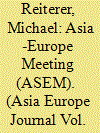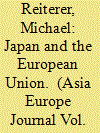|
|
|
Sort Order |
|
|
|
Items / Page
|
|
|
|
|
|
|
| Srl | Item |
| 1 |
ID:
086431


|
|
|
|
|
| Publication |
2009.
|
| Summary/Abstract |
Since its inception in 1996 ASEM has provided an opportunity for focussing relations between the EU and East Asia as a forum for informal multilayered dialogue and building a framework for enhanced cooperation in the political, economic and social/cultural fields. Inter-regionalism, of which ASEM is the incarnation in the EU-Asia relationship, developed into an important policy tool of the EU in an effort to maintain a multipolar setting. Regional identities in Asia are at a different level when comparing South East Asia, North East Asia, East Asia and South and Central Asia. ASEM contributed to a certain extent to the region building in East Asia. Although the economic pillar of ASEM turned out to be the more important one when compared to the political and the people-to-people pillars, it will not become the basis for a (deep) inter-regional free trade agreement because of the diversity of the Asian members, reinforced by the last ASEM enlargement. However, turning weakness into strength, ASEM could become the EU's vehicle for a more holistic approach to Asia thereby fostering a more economic and political multipolar world order. The financial melt down of the international financial order lead to the rediscovery of the need for international cooperation not only on the level of business but also among states. Making use of ASEM, developed over the last 12 years, could provide the much needed platform in the EU-Asia relationship.
|
|
|
|
|
|
|
|
|
|
|
|
|
|
|
|
| 2 |
ID:
073597


|
|
|
|
|
| Publication |
2006.
|
| Summary/Abstract |
Japan and the European Union (Reiterer (2004b) 2:33–42) are both interested in enhancing their international standing in order to overcome their perceived status as economic giants but political dwarfs. While the reasons for this endeavour as well as the inherent characteristics of the actors involved—a traditional nation state as compared to the most advanced integration structure world-wide—are quite different, both entities see themselves primarily as civilian powers (Whitman (2006) 11(1):1–15) without neglecting the need to endow themselves with a military capacity in order to be more effective and credible on a world-wide scale. The ‘EU is emerging as a key regional actor in certain global affairs, particularly in such areas as finance, trade, environment and development, and current policy is directed towards enhancing the role of the European Union in the global governance system. To this end, the European Commission is actively engaged in such issues as the global governance of trade, the protection of human rights, the promotion of democracy, strengthening of regional and global security communities, and encouraging regional integration in other parts of the world.’ (Farrel (2005) 10(4):452–453)—all areas, except the latter task, where the EU and Japan could potentially cooperate closely.
Objectives Before identifying shared foreign policy interests between the EU and Japan, I will first bring to light some of the interests the EU has in East Asia in general; secondly I will chart the major Japanese foreign policy interests which will allow me to map out areas of potential common interest and concern.
|
|
|
|
|
|
|
|
|
|
|
|
|
|
|
|
|
|
|
|
|